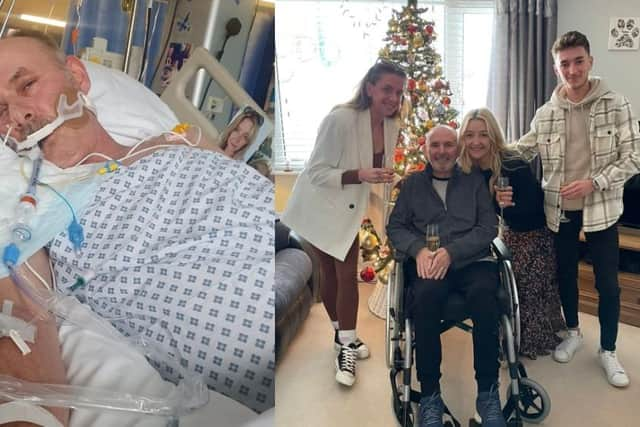Cowplain man, 58, suddenly paralysed after being struck down with illness - and spends 300 days in hospital
and live on Freeview channel 276
Mark Hobbs, 58, a construction site manager, was diagnosed with Guillain Barre syndrome in February 2022 – his immune system was attacking his own nervous system, causing paralysis and lung failure.
READ NOW: QA critical incident
He went on to spend more than 300 days in hospital before being discharged just in time for Christmas 2022. Now, a year on from his release, he is supporting an NHS Blood and Transplant campaign for more awareness of plasma donation, after his own treatment.
Advertisement
Hide AdAdvertisement
Hide Ad

Mark went from feeling tingling in his hand when arriving at work in the morning, to losing his sense of balance, and by 8pm that night he was in Queen Alexandra Hospital in Portsmouth in a coma, paralysed from the nose down, with a ventilator to keep him breathing.
Mark said: “I was driving to work and I was feeling a bit rough. I had some tingling in my hands and my legs started to feel weak at the knees. I just said ‘something is not right’ and I got somebody to drive me home and my wife took me to the hospital. By the time we got there, which is only 15 minutes away, I was only just about able to walk and I went downhill over the day.”
Starting that night, he received five days of intravenous immunoglobulin treatment. The immunoglobulin contained healthy donor antibodies, which helped his immune system to calm down and stop attacking his nervous system. Immunoglobulin is made from plasma donations.
Mark said: “The immunoglobulin was absolutely lifesaving. Without it, I would have got progressively worse and probably wouldn’t have made it. I had one of the harshest strains of GBS - acute motor and sensory axonal neuropathy.”
Advertisement
Hide AdAdvertisement
Hide AdToday, Mark can breathe on his own, and is trying to build his muscles back with exercise and physical therapy. He still has weak ankles and balance problems and his hands and feet are still not back to normal.
His wife Suzi, 54, who is a blood donor, said: “Marl had to learn to speak, swallow and breathe again. For a long time in hospital he basically communicated with his eyes up and down for yes and no. ”I think plasma donors are heroes. They are going to save a lot of people’s lives. Without plasma donors, Mark wouldn’t be here today.”
If enough people came forward as new donors at the region’s donor centre in Reading over the next year, that would provide enough plasma medicine to save or improve around 100 lives, reducing how much the NHS has to import and creating a more secure supply chain for patients. There are currently around 2,400 regular plasma donors at the Reading centre and 2,300 more are needed over the next year.
People in Hampshire can also support the campaign by donating blood, as the plasma from their blood can also be used for medicines. NHS Blood and Transplant is running the ‘All Types Can Save Lives’ campaign this month [November] with the message that most people can donate, no matter their blood type or background.
Advertisement
Hide AdAdvertisement
Hide AdDonation only restarted two years ago and NHSBT research shows most people are willing to give plasma but many don’t know if they are eligible. Plasma is part of your blood. It is used to make medicines which treat more than 50 different diseases. Plasma donation is similar to blood donation and takes about 35 minutes. The difference is blood is gradually ran through a machine which separates out the plasma. Plasma does not need to be matched by blood type.
The donor’s plasma contains antibodies, part of your body’s immune system, which strengthen or stabilise the patient’s immune system. Shannon Thomas, nursing leader at Reading Plasma Donor Centre, said: “Many people don’t realise that they could donate but our amazing donors come from all walks of life. They will help and save and improve the lives of people like Mark – it’s great to see him recovering.”
“If you’re aged 17-65, fit and healthy, regardless of your blood type you could become a lifesaving plasma donor. Most people can donate plasma – and it feels great to provide life-saving medicines.”